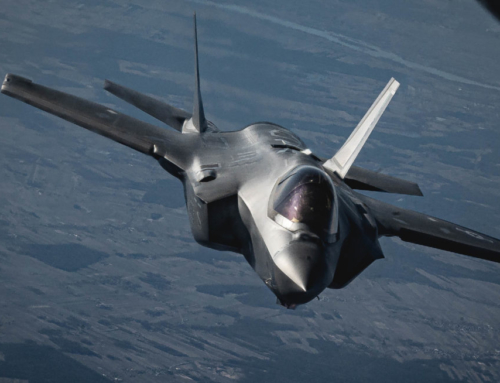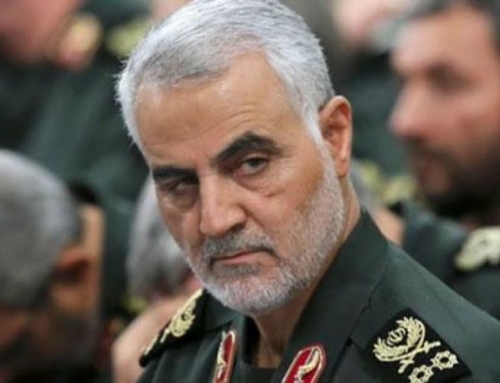Last Sunday on 60 Minutes the Secretary of Defense, Leon Panetta, said if the U.S. gathered intelligence that Iran was building a nuclear weapon, it would be a red-line, and all options were on the table, including military.
On the surface, I find the statement a little ludicrous. Even the United Nations International Atomic Energy Agency says Iran is developing nuclear weapons technology. The administration’s official line is that they “aren’t convinced” Iran has decided to make a weapon, and that maybe they’re simply building the components for a nuclear device that someone can assemble later – should they choose. Huh? That’s not a red-line?
They’re trying to make a bomb, period. Given that, what will it really take to get them to quit? In my mind, it’s simple: Regime change.
I’m not making the case that the only viable option is to invade them with ground forces. I’m saying that threatening to attack their nuclear facilities will not deter the Iranian regime – even if we could do it. That’s not the Iranian center of gravity. A credible threat against the regime, on the other hand, is.
All estimates are that Iran will have the capability for a nuclear weapon within 12 months, and all eyes are on Israel to see whether they will attack before that time. There are some indications that Israel is gearing up for an attack. Both Barak, the defense minister and Netanyahu, the prime minister, have elevated their rhetoric and the largest joint military exercise between Israel and the United States has been postponed. The official reason is to avoid ratcheting up tensions in the region, but some speculate that Israel didn’t want the hassle of protecting 5000 US soldiers from retaliation should they choose to strike Iran next spring.
Despite its preparations, Israel realizes they cannot destroy Iran’s nuclear capability with a fly-by air-strike. This mission won’t be as easy as taking out Iraq’s nuclear plant in 1981, or Syria’s in 2007. Iran has learned from those attacks, and has dispersed its capability over a wide region, along with burying it deep underground. An attack on Iran’s nuclear capability at this stage will involve something akin to shock and awe prior to the Iraqi invasion of 2003, whereby air defenses are neutralized, followed by days if not weeks of aerial bombardment. And even that’s no guarantee. At most, airstrikes will set back the development by a few years, but it will still come.
Covert action has done a good job of slowing down the process, but it alone won’t stop the development of weapons or deter the regime. Inserting faulty equipment into the Iranian pipeline, spreading computer viruses, and assassinating scientists have all helped to turn what should have been a year-long project into a decades-long one, but progress still continues.
Speaking of covert action, another scientist was killed in Iran by a magnetic bomb last month, and everyone is pointing the finger at the CIA or Mossad, while forgetting the other countries in the region. Make no mistake, the Sunni states of the Arabian Peninsula in no way want a nuclear Iran. It’s quite possible the killing could have been conducted by Saudi Arabia. After all, they’d have much greater access and Iran tried to assassinate their diplomat last October. There’s no love lost between the two. The CIA’s access would be through Lebanon and Hezbollah, but since Hezbollah rolled up our entire network in November, I’m betting we have very little penetration capability, and Mossad would also have a tough time getting anything done inside Iran. Given this was the fifth scientist killed, I wouldn’t be surprised if Mossad and some other Sunni state were cooperating together. But I digress.
The bottom line is that both overt and covert strikes only slow down the process. Stopping it has to be a decision by the regime itself, either the current one or a new one altogether. The current sanctions might engender this result if the population finally gets fed up and pressures the regime to quit, but I’m not holding my breath. Sanctions, while a nice way to show we’re “doing something”, rarely result in a modification of behavior. In fact, it’s just as possible that the sanctions could have the opposite effect: the population rallies around the regime because of the activities of the “Great Satan”. It’s assuredly happened at the regime level, as the ongoing tensions with the west have tamped down the internal struggle between Ahmadinejad and the ayatollah.
The biggest problem with sanctions is not whether they will work or not, but the time required. It could take longer for the population to get fed up than it does for Iran to build a weapon. And once they do, regime change from the inside is no longer an option. If they get a weapon, there will be no Arab Spring in Iran. In no way would we want a repeat of the chaos inside Libya or Syria with a nuclear weapon in the balance. In fact, it’s not exaggeration to say a nuclear weapon would ensure the regime’s survival against any internal threat, as the west wouldn’t do anything to support it– something which they are well aware of.
That survival instinct is what must be addressed. Threatening to surgically remove their nuclear capability isn’t enough. The regime is the center of gravity. Deterence involves a simple formula: threaten something held more dear than the goal they seek. For totalitarian states, that is the leadership itself. If the regime believed that we felt the threat of a nuclear-armed Iran was so dangerous that it would be worth the costs of getting rid of them – in effect, another Mideast war – they would stop.
There is another, cheaper, way than all out invasion, though we don’t have the balls to say it out loud. I think deterrence could be achieved by simply intimating that instead of air-strikes on the nuclear facilities, the shock and awe would be directed at any and all government structures. In effect, tell them, “you keep progressing forward, and we’re coming after you, not the nukes”. This very application of force was used by Ronald Reagan in 1986. Operation Eldorado Canyon was initiated to deter Libya from sponsoring terrorism. Eighteen F-111s pounded anything related to Moamar Qadaffi. The message: Knock it off, or we’re going to kill you.
The problem here is credibility. Iran would have to believe we mean it, and that’s a tall order, because I’m not sure we do, even with all the rhetoric of red-lines. We simply don’t have it in us to conduct a counter-leadership campaign. We’d rather go toe-to-toe with their military because somehow that’s deemed more respectable, regardless of the exponential increase in both dollars and lives. At this juncture, when we’re fleeing both Iraq and Afghanistan, coupled with the new defense guidance, nobody on the entire earth would believe America is willing to get involved in another ground war, regardless of the stakes.
Israel, on the other hand, could project the message just fine, and I doubt they have the same ridiculous notion of fair-play that we do. National survival tends to trump that. With Iran having already stated they should be wiped into the sea, I’d have no trouble believing Israel if they said they were going to remove the regime.
And neither would Iran.










Mr. Taylor,
You have written a sound analysis regarding Iran and the future of their nuclear program, in my opinion. I especially favor that you not only outline your take on the region, but offer a solution to the problem(s) as well. I am hesitant to insist on a regime change however, in that it might (would) be spun as a Western, Zionist anti-islamic maneuver that would pacify any voice of reason still remaining in the region. Would this not be viewed as simply more ‘American Imperialism’ and embolden them? In the long term, how can we do anything other than stall nations such as Iran from advancing technologically to the point where a nuclear weapon is simply another step, albeit an optional one, in their natural progression? I recognize that Iran is somewhat of an unique case as their appetite for a nuclear weapon is more ravenous than, say, Sweden, but where do we draw the line in terms of foreign policy? With little historical precedent in quelling nations’ nuclear aspirations, I am curious as to your thoughts on the matter. Thank you for your time.
~Matthew
Matthew,
Yes, there is a risk of backlash, but I’m not so sure it would be as great as you say. As I said, no other Arabic state wants a nuclear Iran. Remember, Iranians are not Arabic. They’re Persian. There’s a cold war going on over there right now between Saudi Arabia and Iran, with both looking to be the king of the region. We could conduct covert diplomacy beforehand, and, while there will definitely be a reaction from the “Arab Street”, I’m not so sure it would be fanned by the governments in power. Syria would use it to divert attention from their own troubles, but the response from others such as Qatar, UAE, and KSA would be tepid at best, with the governments in power tamping down public reaction off the record. Of course, there is a risk that the population becomes so incensed that the governments are forced to condemn the action as a fig-leaf to their own constituents, but in the end we have to decide whether a nuclear Iran is a greater threat than the repercussions of removing the regime.
As for your second question, we draw the line precisely based on the perceived threat of the nation seeking to acquire nuclear weapons. Sweden is not, nor will not, pose a threat to the United States or our allies. Iran, on the other hand, is a regime run by men wrapped in hegemonic goals and tottering on the brink of using the weapons for reasons we would consider insane. Not to mention the very real threat of them turning the technology over to a terrorist group such as Hezbollah. We have no idea how it will leak, and that is something that cannot be tolerated. Iran’s nuclear capability exists at the stage it is in precisely because Pakistan leaked the technology to them. Perhaps the type of regime is a cutline for folks seeking nuclear weapons in the modern era. It’s not a question of a nuclear weapon being a natural progression for modern states. Stable, democratic governments could care less about wasting money and effort building a weapon (Sweden could build one, as could Germany and Japan – all have nuclear power plants), but regimes run by totalitarian states that face a risk of being overthrown by their own people seek it out (I guarantee Syria wishes it had one, and one need look no further than North Korea). In the end, regime change would send a strong signal to other totalitarian states that their “natural progression” should look elsewhere.
Brad,
Refreshing commentary on the Iranian issue. I believe a regime change, and stating that is our goal before any intervention, is key to the success of any overt operation in Iran. The Mullahs are not trusted throughout the region. The Saudi’s and the Turks are extreemly concerned with the influence Iran has been able to grow since the downfall of Sadam and to a lesser extent the Taliban on Iran’s other border. Just about every Arab Gulf state has similar concerns about the growing influence of Iran in the region and within their own countries. The key to a successful overt action against Iran would be to align these nations with our goal of regime change thus building another Arab-U.S. coalition as seen in the Gulf War.
I believe any overt action would have to be overwhelming and decisive. Remember that Libya helped bring down Pan Am 109 in retaliation for Reagan’s strikes. This would definitley be a similar course of action Iran would take against us and the proxy whoop’n boy, Israel. Israel would most certainly face an increase in violence from Iran’s friends in Syria and Lebanon.
If we acted within the coalition and appealed to the Iranian people, we could see a successful outcome. Another question to consider in any overt operation to remove the regime would be the question of sustainment operations. It isn’t hard to believe that the populace would exact revenge on the Revolutionary Guards et al. I imagine we would want no part in that nor would the coalition. However, if Iraq taught us anything, we should definitely plan for the worse in this area.
Now, I don’t expect anything to happen outside of the current covert level of operation going on right now. With the election coming on and our economic situation as well as the war in Afghanistan still unfinished we won’t see anyone take a definitive stance on this issue.
Marc,
I’ve tried coming up with an intelligent rejoinder to your post, but I have to say, I agree with everything you put forth. Especially the part about the aftermath of operations, something we seem to have forgotten with Libya, and which is now in the very mess you mention (although we don’t seem to care. It’s all about the cheap “victory”). And yes, you’re exactly right about the original Libyan intervention. Pan Am 103 was something I considered mentioning in the blog, mainly because for deterrence to truly work, the threat has to be perceived as viable.
Qaddafi did cease terrorist operations for about a year, and then felt he was safe and picked them up again. A Pan Am 103-type repercussion is something I’m toying with exploring in Book IV. I said I’d never write about Iran because they’re too easy a villain, but I’m leaning that way based on the potential aftermath of whatever strike is about to occur. And a strike is no doubt coming. Although, I think it has little chance of stopping Iran’s nuclear ambitions.
Thanks for the post. Very insightful.
Brad
Brad,
It would be hard not to tie Iran into any non-fiction, military book these days. With all the intrigue between the Mullahs and the politcal arm of the revolution, the Revolutionary Guard’s web of political, financial and military interests, the foreign surrogates who do the bidding of the Islamic Republic in other countries….lots to write about. I’ll look forward to reading it and your next post.
Marc
Reading your analysis of Arab-Persian relations I only want to add that there is about a 2,500 year history of the Persians invading and dominating land from what is now Turkey to Egypt–long before Islam. I doubt if this makes for kind and loving memories in the middle east.
Steve,
I was speaking with a Lebonese acquiantence the other day and I was surprised to hear him scoff at Turkey’s publically renewed interest in the Middle East and possibly stepping in to counter the Persian influence in the area. He did not have much good to say about the Turks and recalled their occupation of the region with disdain.